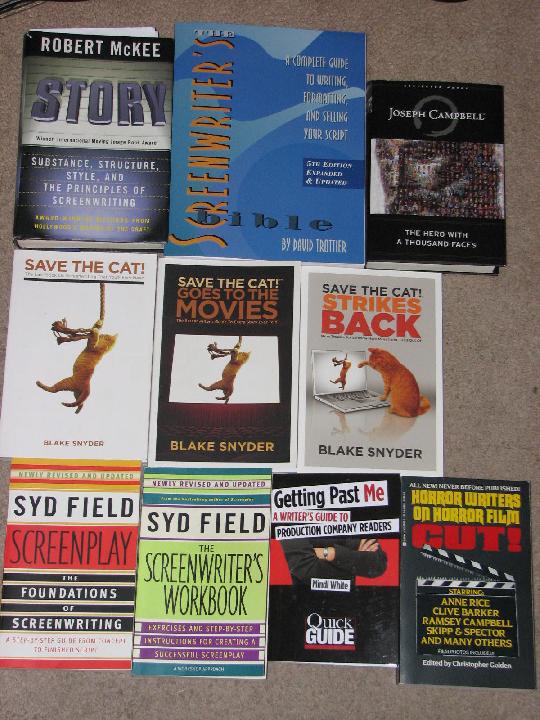OK, I'm reading it, and I'll be giving a running commentary over the days. Thanks again, Scoopicman. 
It's a great book and quite a page-turner, but I'm having some issues.
First of all, the late screenwriter, Blake Snyder, says there are only so many structures, and, as I've said before, I know of this argument. But that argument cannot be falsified, because, anytime someone comes out with a new twist or new plotline, Snyder can say it fits into one of the previous structures.
And I'm having problems with his various plot structures. The first one, Monster in the House (MITH), talks of how the characters deal with the well, monster. He says that a MITH movie must have a monster (fair enough) which is in a house. He defines "house" as an enclosed space which can be "a family unit, an entire town, or 'the world.'" Well, again, if an enclosed space can be as big as the world, then that's not a meaningful statement, is it?
He also refers to "The War of the Worlds" as unsatisfying. Ummm, that book by H.G. Wells is one of the greatest novels of English literature, and the first move, released in 1953, was a success, and so was the remake by Spielberg in 2005. And anyone who has read up on science fiction would know that the novel was an allegory on the international situation, where the British were going around beating up on natives, so Wells wanted his readers to know what it was like to have a superior military power do the same to them.
I flipped ahead, to the story of the "Fool Triumphant", which involves a fool or underdog who wins the day. He says that such a story must have a "Jealous insider", someone who knows the true potential of the fool and who wants to trip that fool up. Snyder gives as an example, the movie "Amadeus", where Antonio Salieri realizes how wonderful Mozart really was and tried to stop him from attaining greatness. He also mentions the Pink Panther series, where Chief Inspector Dreyfuss hates Clouseau and wants to get rid of him.
Amadeus is a good movie, but I'm a fan of the Pink Panter movies, and Dreyfuss was NEVER jealous of Clouseau. In fact, Dreyfuss hates Clouseau because Clouseau was a fool.
Far more important are the underdog movies that don't have the jealous insider - Rocky and the Karate Kid are obvious examples. The TV series, Columbo, would be another, though those are TV movies as opposed to theatrical releases.
I don't want to be too critical, and I am learning, but I will take the information with the proverbial grain of salt.

It's a great book and quite a page-turner, but I'm having some issues.
First of all, the late screenwriter, Blake Snyder, says there are only so many structures, and, as I've said before, I know of this argument. But that argument cannot be falsified, because, anytime someone comes out with a new twist or new plotline, Snyder can say it fits into one of the previous structures.
And I'm having problems with his various plot structures. The first one, Monster in the House (MITH), talks of how the characters deal with the well, monster. He says that a MITH movie must have a monster (fair enough) which is in a house. He defines "house" as an enclosed space which can be "a family unit, an entire town, or 'the world.'" Well, again, if an enclosed space can be as big as the world, then that's not a meaningful statement, is it?
He also refers to "The War of the Worlds" as unsatisfying. Ummm, that book by H.G. Wells is one of the greatest novels of English literature, and the first move, released in 1953, was a success, and so was the remake by Spielberg in 2005. And anyone who has read up on science fiction would know that the novel was an allegory on the international situation, where the British were going around beating up on natives, so Wells wanted his readers to know what it was like to have a superior military power do the same to them.
******
I flipped ahead, to the story of the "Fool Triumphant", which involves a fool or underdog who wins the day. He says that such a story must have a "Jealous insider", someone who knows the true potential of the fool and who wants to trip that fool up. Snyder gives as an example, the movie "Amadeus", where Antonio Salieri realizes how wonderful Mozart really was and tried to stop him from attaining greatness. He also mentions the Pink Panther series, where Chief Inspector Dreyfuss hates Clouseau and wants to get rid of him.
Amadeus is a good movie, but I'm a fan of the Pink Panter movies, and Dreyfuss was NEVER jealous of Clouseau. In fact, Dreyfuss hates Clouseau because Clouseau was a fool.
Far more important are the underdog movies that don't have the jealous insider - Rocky and the Karate Kid are obvious examples. The TV series, Columbo, would be another, though those are TV movies as opposed to theatrical releases.
******
I don't want to be too critical, and I am learning, but I will take the information with the proverbial grain of salt.


